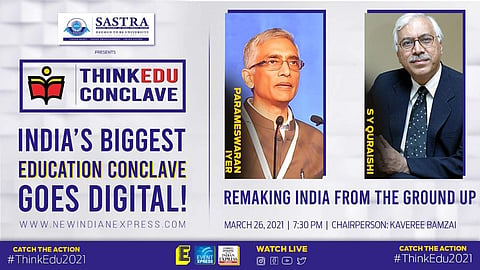

Former Water Secretary and Sanitation Specialist Parameswaran Iyer and former Chief Election Commissioner and Writer S Y Quraishi sat down with Kaveree Bamzai to discuss their experiences in the IAS and why young people today should opt for the IAS as a career, during the ThinkEdu Conclave. Quraishi said that it was the IAS that was keeping the people of the country united and it was a job that never went ‘stale’.
Quraishi says that the IAS is a unique institution and an extremely important service, “Like Iyer, who is from Tamil Nadu but worked in Uttar Pradesh, many people move to brand new states and the officers are also from a range of professions. Also mostly people don’t prefer to go to backward regions but for IAS officers, that would be the biggest pleasure. In this job you are always learning, it never goes stale.” To a question on why specialisation in a particular area could help, Iyer said that he actually happened to stumble into the area of water and sanitation, “I kind of stumbled into specialisation. I was posted to UP for rural development and it didn’t seem very interesting but when I was in charge of rural water and sanitation, I realised that it was a very fascinating field. I realised that I can actually contribute and make an impact. I believe it is important young IAS officers start thinking of a broad area of expertise. In today’s world it is important to have a little more domain knowledge.”
The duo also discussed the prestige of the District Magistrate post, “My belief is that whatever post you hold, you leave the post better than you find it. The DM’s post is the backbone of the Indian administration. It gives you a world of opportunity and chances to use your capabilities. The elections are the biggest management event and Hillary Clinton also once said that India’s elections are a gold standard,” Quraishi said. Iyer agrees too. Speaking about the Swachh Bharat project, “We followed the four P’s - political leadership - this was the first time that a Prime Minister was talking about sanitation at the Red Fort, this was a game changer. Second ‘P’ is public financing, not other countries and though to allocate funds for such public good, the third ‘P’ is public partnership with NGOs, media and final ‘P’ is people’s participation. We were able to motivate people and young collectors to participate in the national programme,” he explained.
Quraishi spoke about his extensive work when it came to voter education and how he initiated the National Voter Day on January 25. Speaking of political leaders, Quraishi said in his experiences 9 out of 10 times, there was no clash with the politicians and when it did happen, the solution was to improve communication.
Iyer advises that no matter where an officer is posted it is important to seize the day and to just go with the flow and make a difference. “An IAS officer has to always be on their feet,” he adds, “There is no substitute to grassroot work. My grassroot level work helped me while I worked at the World Bank.” On what advice they would give to aspiring IAS officers, Iyer said that it was a fascinating career and one has the opportunity to make an impact on the ground and that no other profession offers that opportunity. “Every officer goes through a remarkable journey and they transform the lives of people on the ground,” he said. Quraishi added that after all these years and having faced so many problems in the job, he would still choose the profession over anything else.
